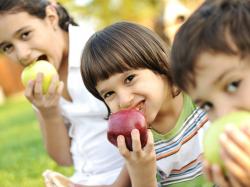Freshfel: Solving The Equation To Increase Fresh Produce Consumption
March 29, 2012 | 3 min to read

Freshfel Europe, the European association representing the interests of the fresh fruit and vegetables supply chain, is extremely concerned by the results from its latest ‘Consumption Monitor’ which shows an alarming downward trend of consumption patterns nearly all across Europe in the last decade. Indeed, between 2000 and 2010, fresh produce consumption has decreased by 100 g, the equivalent to a full portion per day per capita! The association believes that it is only through a multidimensional approach and avoiding oversimplification that all relevant stakeholders will be able to work towards reversing the current situation.
The recurring issue of high prices of fresh produce for consumers is, on the one hand, a clear misperception of the reality, as fresh fruit and vegetables are one of the cheapest food categories available. Prices for the recommended “5-a-day” are actually ranging between €1 and €2, depending on the categories chosen. On the other hand, fresh produce is itself also under pressure due to various factors. There is an increasing competition for the consumer’s “stomach share” (ready-to-eat/convenience products, lesser at-home-cooking and more out of home consumption), while the consumer is not always aware that these alternative servings might not have the same nutritional value as fresh produce. The lack of penetration of fresh produce into the foodservice sector is therefore also of concern.
The sector is weakened by its fragmentation and limited marketing budget, posing a disadvantage compared to major agrifood businesses. Under such circumstances, the lack of a unified and homogenous message to consumers, as is currently the case through e.g. all the different “5-a-day” messages in Europe, is hampering the efficiency of a clear communication to European consumers. The sector is also struggling to valorise the image of its products, and highlighting the pleasure and enjoyments of consuming fresh produce, while other agrifood businesses keep (mis)using fresh produce assets for marketing their products, appropriating the positive image of fresh fruit and vegetables despite having none or little actual content (as shown by the “Where is the fruit?” 2010 study by Freshfel). Added to this, addressing simplified messages on food safety that sometimes appear in the media, leaves the sector with only limited possibilities to rectify accusations once they reach out.
On the bright side, several surveys confirm that consumers are ready to increase their fresh produce intake. As scientists, public authorities and health professionals have been claiming for long now, a diet rich in fruits and vegetables comes along with undisputed multiple benefits with regard to nutrition and health, the environment, social costs and even cultural assets. There is support of health institutions such as the World Health Organisation (WHO), but it is also being integrated in new policy making by the EU institutions, a clear example of this being the EU School Fruit Scheme. Further opportunities are in innovation and research, as well as within the environmental debate, where the production of fruit and vegetables is well placed compared to other food categories.
Ramon Rey, President of Freshfel Europe, stated: “The sector needs to size these opportunities and profile fresh produce’s image to consumers and decision makers. A collective communication taking “fresh produce” as a category is needed. At Freshfel, we certainly support this approach and are making available the “Enjoy Fresh” Platform (www.enjoyfresh.eu) to this end.”
In response to this, Freshfel is currently present at different fora and in discussions with all concerned parties to elaborate common actions on how to reverse these alarming trends. Freshfel recently shared views with colleagues of AREFLH (the Association of European regions producing fresh fruit and vegetables) on the occasion of its AGM, at a workshop of the public health sector (organised by EPHA, the European Public Health Alliance), or today at a major EU conference on the EU School Fruit Scheme programme. Furthermore, this matter has been addressed with the European Commission services on different occasions, to incorporate this state of play in the current policy review (CMO and CAP reform, promotion policy, School Fruit Scheme, etc.).
Innovative synergies and cooperation need to be generated to turn around consumption trends. It should get the support from the whole fresh produce sector together with the health and scientific sector, as well as public authorities at different levels.
Philippe Binard, General Delegate of Freshfel, concluded: “Freshfel is seeking a broad support to its ambitious project of giving a fresh start to the consumption of fresh fruit and vegetables. It therefore urges everyone not yet involved with Freshfel to join forces with the “Enjoy Fresh” project which aims at bringing to consumers the positive story of fresh produce and to identify with clear and simple messages all the consumption benefits. Unlike other products, consuming fresh fruit and vegetables can and should be made without limitations!”
Source: Freshfel
